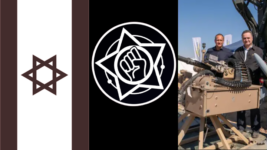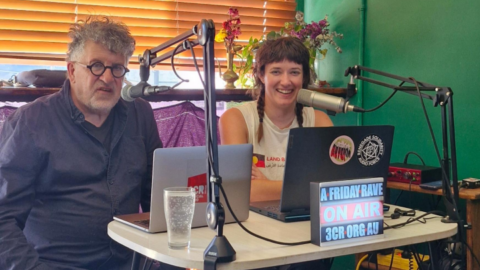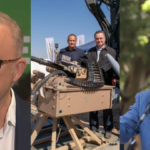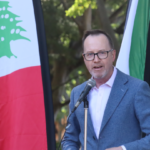Australia’s Arms Exports System Is a Loose Free-for-All: Interview with Renegade Activists Jacob & Mercedes

Australian arms exports became a front and centre issue in October 2023, on outbreak of the Gaza genocide, and regardless of the fact that former Palestine stalwarts PM Anthony Albanese and foreign minister Penny Wong were reimaging the mass murder of civilians as an act of self-defence, much of the constituency wanted to ensure this country was not contributing to the slaughter.
In writing for Declassified Australia, human rights lawyer Kellie Tranter pulled a rabbit out of her hat the following month, with evidence that Australia is the sole producer of the device that opens the weapons door of the F-35s that were presently carpet bombing Gaza, and while there were a few more trickles of information since, it was only of late that many more revelations started flowing in.
Ministers consistently denied that Australia had engaged in military exports to Israel for the past five years, until that wording had to change to no weapons being sent to Israel, after more evidence of parts came to light, and when an entire Australian made weapons system was recently photographed in Israel, the PM threw up his hands and simply repeatedly denied Australia exports arms to Israel.
So, after months of probing, it appears that Australia is exporting arms to Israel and has continued to throughout the mass killing.
Indeed, the evidence has been so hard to locate, as it’s been buried along the way, and further than that, as Renegade Activists Jacob Grech and Mercedes Zanker have uncovered keeping account of what our nation does export militarily is not even much of a concern for the Department of Defence.
Sydney Criminal Lawyers spoke to 3CR’s A Friday Rave hosts Jacob and Mercedes about how the Department of Defence is keeping track of defence exports, the ways in which the government has been legislatively tweaking language to hide what’s going on, and why, after this week’s federal election, we can expect this continent to continue on its current path of increasing militarisation.

On your 18 April episode of Friday Rave on 3CR Radio, you were discussing the export control permit list detailed on the Australian Defence Export Office (ADEO) website, which involves export permits being granted for munitions and dual use products to various nations around the planet.
You mentioned that the Turnbull government kicked off this process in 2018, which aimed at making this nation a world leader in defence exports.
The listing of export permits on the ADEO website commenced in 2020, and ever since then the amounts covered by these export permit lists have been skyrocketing, as has the overall contribution that Defence is making to the nation’s GDP.
But as you further highlight this is a highly flawed system due to the accounting process it involves.
So, Jacob and Mercedes, could you give us a bit more thorough explanation as to what appears to be the rather loose manner in which our government is overseeing these processes, and further what would you say are the implications of the way successive governments are handling this?
Grech: This shift did kick off under Turnbull, but it was implemented under successive governments, and the point about successive governments is there really is no difference between the Labor and Liberal government, when we are talking about military sales, military intervention or foreign policy.
The arms industry, the military-industrial complex, is bigger than any Australian government, so it is not about the governments as such, or one as opposed to the other.
In talking about it being loose. We have three different government agencies monitoring and reporting on Australian arms exports, and the last time I looked into the comparisons was in 2022.
Over that year, we had the Australian Defence Export Office talking about $5.7 billion worth of export permits, whereas DFAT, who are tasked with reporting arms exports under the Arms Trade Treaty, reported $139 million worth, while the Australian Bureau of Statistics reported on $165 million worth.
That tells me that the Australian government and its various agencies have absolutely no idea as to the real level of Australian arms trade exports.
Zanker: On our last show, we were discussing the export permits listed by the ADEO that were granted for the year 2023/24.
These are estimated values that companies self-report about their proposed permits and, in 2022/23 the estimated value of overall permits was $15,889,106,968, but in terms of the 2023/24 defence export controls summary report, the estimated value is $103,083,990,076.
So, from 2023 to 2024, there is a massive jump of over $87 billion worth of permits granted.
These values are estimated and self-reported. They’re not verified by the department either. So, not only is there this massive disparity between years, but in that, they don’t equate to actual exports, and there is no reporting on what activity occurs under the permit.
So, we’ve got $15 billion and then over $100 billion worth of permits, but there is no explanation as to what has made up this difference.
Grech: The other thing to bear in mind is that while they are approving all these defence export licences, which are obviously climbing, there are very few that have ever been knocked back.
Zanker: That’s right. So, in 2023/24, the total number of export applications prohibitions and denials involved 23 permits, with the largest amount being prohibition orders for military end use products.
So far, for the first quarter of the current year, 2024/25, the total number of denials has been less than five.
Grech: My point on that is that if they’re approving hundreds of billions of dollars’ worth of exports and they’re only knocking a few back, the default position seems to be approval.
So, once it is approved, there is no monitoring of whether any of these sales have proceeded.
For example, I might want to export something to Malta, and I apply for an export to send more than $1 million worth of product to Malta, because the Maltese entity needs to know before they enter into a deal with me that I have the ability to export to them, and the legal framework to export the goods.
Now, if I am applying to send my product to Malta, I might think, why not try selling some in Cyprus as well? So, I seek these approvals from the ADEO and end up with $2 million worth of approvals in that regard.
Once I have got those approvals, and if I’ve got the sale, there is nothing more that I need to do. But even if I don’t make the sale there is nothing I need to do either.
So, what this ADEO permit system does is basically removes any real need for the permits, because if they’re approving just about everything – over 2024 it was about 4,000 permits approved with only about 20 denied – the ones they have knocked back in principle are probably outrageous ones like attempting to export uranium to Pakistan.
By approving everything, you remove the value of the actual permit itself. So, what it does is it creates a free-for-all for Australian defence exports.
It’s important to point out too that all these permits are not just for weapons, as the public would generally understand, as they’re also for particular metals, particular rare earths, components and they’re even for particular technological transfers.
This is creating a free-for-all, and further, the DFAT statistics on export permits are way under the value of ADEO’s reporting, so there is no way of knowing which permits have actually been exported.
What that means is we have no idea of what Australia is exporting to where in terms of defence exports.
So, how does this apply to the situation with arms to Israel at the moment?
Israel is a special case in point, obviously, because of all the scrutiny at the moment. But we do have a situation relating to the Electro Optic Systems R400 weapons system having turned up in Israel during a genocide.
We have a situation where our prime minister has been saying we do not export weapons to Israel.
But unfortunately, he’s just saying this to reporters, but if he was writing it, he’d have to capitalise the word Export and capitalise the word Weapons, because various pieces of treaties and weapons legislation have changed the definitions of words and terms used around exports.
Australia can now export weapons to the United States without a permit, even an ADEO permit, under the licence-free environment that came into play on 1 September last year, due to AUKUS.
We can now export to the United States and the US can send what we export off to Israel, without any reference to the Australian government, because the United States now considers Australia to be a domestic source for weapons.
This means that if something is exported to the US, like the EOS R400, it’s transferred to the United States to the EOS warehouse in Huntington, Alabama, and then it can be exported to Israel without any reference to the Australian government.
So, again, there is no way of knowing what we send to Israel. The best way I can think of this is, many years ago, I was in court for selling a bit of weed and I had to say to the magistrate, “Well, I didn’t sell that to him in Victoria, your honour, I went over to the border to Albury and sold it to him there.”
All they do is change the jurisdiction, and then they can do what they want.
Zanker: The Defence Control Trade Amendment Act 2024 (Cth) came into force in September, and it’s the Australian legislation that’s created a licence-free military trading environment.
The corresponding US legislation is called the Exemption for Defence Trade and Cooperation Among Australia, the United Kingdom and the United States. This legislation creates an exemption from the US International Traffic in Arms Regulations (ITAR), and it also redefines certain terms.
So, the term “transfer”, under the exemption, is replaced by the term “activity” in some sections, but in others it refers to “reexport”.
Reexport has quiet an interesting use in application to Australia and the US, when it comes to the 2007 Australia-US Defence Trade Cooperation Treaty.
Grech: Yes, reexport means exported by the United States. So, we can export goods to the United States and the US can do whatever it wants with it, and it is not classified as a reexport.
But a reexport is something the United States sends to us. So, if we want to reexport something to the US, we need the approval of the US government, but if the United States wants to send something of ours somewhere else, they don’t need our approval.
So, you’ve saying that towards the end of the last decade the Australian government has created a very loose and extremely convoluted process to govern Australian defence exports, and of late, the US and Australia have been legislating to expand on this, which is making these arrangements even more opaque.
That’s correct, and this goes further. You might have some sort of understanding of bonded warehouses. If something is imported to Australia it isn’t classified until it leaves the bonded warehouse, after the export duties have been cleared.
This is in much the same way that you haven’t actually entered a country until you pass through passport control, and beforehand, you’re in that no-man’s land, which is an international zone.
We’ve been trying to verify this at the moment, but there appears to be a situation where we can export something to the United States, which then goes to the United States bonded warehouse in Newcastle, and from there, because it is already under US control at that point, it can simply be exported from the US to another country, including Israel.
So, there would be no need for something to be physically sent to the United States because what these laws do is they change the normal definition of words, to the point where Penny Wong and Anthony Albanese can say “we don’t export weapons to Israel”, and we don’t because the words “we” and “export” have taken on different meanings, under the legislation.
During your last A Friday Rave show, as you were detailing the last ADEO defence export permit figures, you pointed to a difference in the way that the latest figures had been reported.
The latest statistics now include the end user country that receives the military exports and the numbers of export permits that have been granted in relation to each country.
You two are not the only nongovernment people searching through all this information trying to catch out government ministers lying on weapons exports to Israel.
In late 2023, it revealed that the F-35 components that allow for opening weapons doors are made in Australia.
So, do you consider that all this digging around has led the government to start reporting on the end user countries in terms of defence export permits?
Zanker: That’s a good point. End user listings are required in the permit application process, but it wasn’t until the last report, the first quarter of the 2024/25 financial year, where there is now a new section that lists the end users.
That end user information in the last report tells us that for the first quarter of the current financial year, there had been less than five export permits issued in relation to Israel. So, that means between one and four exports permits approved to Israel.
Why this is being reported now? We don’t know, but it could be potentially because of the interest around this issue since the Gaza genocide broke out.
This might be a pitiful attempt of the government to appear to be coming clean now, but we still don’t know what has been approved.
The fact is that any permits that are being granted to Israel right now are happening during an ongoing genocide that is being investigated by the International Court of Justice, which is really concerning.
Greens Senator David Shoebridge recently revealed that the R400 remote weapons system made by Australian company Electro Optic Systems is in the hands of the Israeli defence minister as the Israeli Defence Force is trialling the weapon.
The trick with this export is that the R400 parts that are all Australian made are then being exported to the EOS US subsidiary and being assembled over there, prior to being exported on to Israel.
Anthony Albanese was asked about this by reporters, and all he was then able to repeatedly say was, “Australia does not export arms to Israel”.
So, what do you think about our prime minister simply continuing with these answers in the face of such proof?
Grech: Well, governments providing the populations with untruths is not something that started occurring in 2024/25, as you’re well aware.
But what’s happening here is we are asking the wrong questions. What we should be asking the prime minister is whether he is aware of any Australian produced weapons components being used in the genocide in Israel, because then he won’t be able to prevaricate behind definitions of words and legislation.
You can say a lot of things about Anthony Albanese, but one thing you cannot say is that he is a fool. He knows weapons are turning up in Israel, but what he is doing is hiding behind the legislation.
Where this is leading us is the bigger question, particularly in terms of militarism.
We are only here talking about one piece of legislation, the Defence Control Trade Amendment Act 2024, which has created a licence-free environment between us and the US and the UK.
And by passing this legislation, it’s allowed the United States to do its own legislating to recognise Australia as a domestic source in US law.
The Australian legislation also created a number of criminal offences regarding providing people with defence technologies outside of either the three AUKUS amigos and 22 other countries.
This offence carries 6 months and a fine of thousands of dollars. Now this prohibition is on technologies including research at universities. So, what that does is it places a prohibition on who can work on what research at Australian universities.
This has been taken up by the National Tertiary Education Union (NTEU).
This also has an impact on who can be employed in factories. So, take that part that Australia produces for F-35 jets, it is being used in Gaza, and this country has a monopoly on producing it. So, these are contained in each F-35 operating anywhere in any air force anywhere in the world.
So, what happens if there is a Chinese national, a Saudi national or dual national working in one of the factories that produces these components?
We’ve created a situation where the Department of Defence is in control of a process that determines, who can research on what projects in our universities and who can work on what projects within our industrial sector.
This is a major incursion of the Department of Defence into areas in Australia that had nothing to do with Defence.
Now, this was the same with the Australian Naval Nuclear Power Safety Bill 2024 that was passed last year. We now have a new nuclear regulator, the Australian Naval Nuclear Power Safety Regulator, which comes in above the two preexisting nuclear regulators.
The two other regulators are ANSTO, which is the science department, and ARPANSA, which came under Health. But now, we have the Australian Naval Nuclear Power Safety Regulator, which is under Defence.
So, what we are seeing more and more is the Department of Defence taking control of legislation and being placed in control of activities that in the past never had anything to do with Defence.
We are seeing an encroachment of the military-industrial complex into Australian life, where it has never been involved before and that’s a very concerning thing.
Zanker: Further to that, Australia’s export control legislation does provide the minister for defence, currently, Richard Marles, with catch-all controls, which means the defence minister has discretionary powers to regulate exports of items that are not specified on the Defence and Strategic Goods List (DSGL).
This is basically giving the minister for defence discretionary power to regulate all Australian exports.
So, considering the US and Australian militaries are becoming ever-increasingly interoperable, what sort of implications could this have in regard to our local defence department having all this new reach into sectors where it’s never had any control before?
Grech: We’ve already had a situation where Chinese study centres, or Confucius Institutes, have been closed down on Australian university campuses.
We’ve already had a situation where the US government has contracted Australian universities directly to check on who is working on their research projects.
Australia has fairly compliant commercial and educational sectors. So, the effect this is having is Australian universities are becoming self-censoring and often self-censoring erring on the side of caution, when it comes to who can work on research projects and what research projects they take on.
In Australia, it has never been about the jackboot approach, because Australian companies, educational sectors and even civil society organisations have been very careful to er on the side of caution, and make sure they fit in with government policies before they are forced to.
You’ve also mentioned around the same time Australia passed the Defence Control Trade Amendment Act, the US amended legislation so that Australia has been classed as a domestic military source under US law. What do you think are the implications of this?
Zanker: Essentially, that means that anything that comes under the banner of Defence, which, as we have just mentioned is encroaching into the educational sector, is now considered a domestic sourced product, which can include critical minerals that are fundamental to weapons manufacture, or science and technology, so all of this is now considered domestic to the US.
This is a licence-free environment, meaning the usual licensing requirements are not required when exporting these things to the US. Anything under the umbrella of Defence in Australia is defined as domestic to the US.
Grech: Also, once we are considered a domestic source it gives up Australian sovereignty. We are making things here that we have no control over, and whether that’s military equipment or coffee, from a sovereignty point of view, we have given our control away.
This includes giving away sovereignty over Australian research, manufacture and trade.
How this would relate to industrial and academic practice, as we are now a domestic source, well, it raises the question as to will Australian practices be changed to align with standards and requirements in the US?
This could entail occupational, health and safety or how certain materials might be classed. As I say, it takes away Australian sovereignty in all of these matters. This is at least in the industrial sector, but it’s also moving into our educational sector.
That’s the biggest implication for Australia as we are getting to a point where we can now ask, what do we mean by Australia?
Our government is giving away its rights to have any say over what is made or researched here.
Another point to throw in is, the whole thing about Australian defence exports, it’s also about the military-industrial complex inserting itself into Australian life, and this hasn’t come out of nowhere.
These companies that are now making military equipment, the small companies at least, which are the companies that used to be making parts for our automobile industry.
Even the factories themselves, the big automobile plants are now being taken over by companies that are making military equipment.
That is because under all of the free trade agreements that we signed towards the end of last century and the beginning of this century, we have giving away our right to manufacture things with government subsidies and that includes everything, with the sole exception of military equipment.
So, unfortunately, whether we like it or not, if we are wanting to keep an Australian industrial base active, the only way we can do it is with government subsidies in the defence sector.
This is a result of the push to neoliberal trade agreements that went down at the end of last century. We have no control over what we are allowed to produce.
Zanker: I just want to add that when we are talking about Australia giving away its sovereignty in terms of manufacturing, education and defence, we still have, simultaneously, Australia consistently denying the sovereignty of First Nations people.
So, this is not necessarily an argument about sovereignty but in fact, the flow of capital. So, if it is the sovereignty of institutions here and this is being given over to the US, it is not about sovereignty over land.
As the two of you are explaining, Australia is essentially handing over all this control to the US in terms of the military sector in this country, and in turn, the local military sector is asserting its control over various social sectors, such as health and education. So, is there anything else you feel is important we raise at this point?
Zanker: What Australia is also offering over in this arrangement with the US is its domestic security services and federal government support to protect companies that are involved in the military-industrial complex.
So, this is why we now have an Office of Defence Industry Support, which is a federal government body that provides support services to assist in getting through the legislative processes governing defence in order for companies to be able to enter into the military-industrial complex.
This also involves providing advice and security frameworks to those companies when they become the targets of protests and public scrutiny.
This is the federal government applying the domestic security apparatus to assist often private companies with security support to avoid that public scrutiny to carry on creating and making those weapons and components.
Further, in turning to what the military-industrial complex is, it is primarily about the flow of capital and what we are seeing is textbook neoliberal capitalism using the market to dictate how defence is so fundamental to economies.
But this goes beyond national borders. This is not necessarily US incursions into Australia in terms of a nationalistic perspective, it is rather about private companies.
So, we’re talking private companies and commercial interests using legislative frameworks of nation states to conduct international multinational business that is beyond national borders.
Grech: That’s right, it’s not just about nation states. We, particularly on the left, have fallen into the habit of referring to the United States and the US military, but we are now moving into a territory under Trump’s leadership, where it is less and less about the US and more about the corporation.
It always has been, really, but it is now becoming more obvious.
When we are talking about the military-industrial complex and global capital, we are talking about global capital, which is based at the moment in the United States, but it is not the United States.
It is important to talk about the international nature of the global capitalist system. We have a situation where, whether you are talking about the United States, Britian or most of the countries in western Europe, our stock exchanges and corporations are controlled by hedge funds based in Europe and the United States but not beholden to them.
The corporations are calling the shots and not the governments, and I just want to make that clear. We are not just talking about the US. We are talking about global capital now.
I was going to raise the point about physical US incursions into Australia, as we’ve got Pine Gap, the 2014-launched force posture initiatives, the AUKUS arrangements and we’re now a domestic source, while in the meantime, we’ve got Trump eyeing off Greenland and Canada.
So, should be worried about further US incursions onto this continent?
Grech: Well, it is an important point with all the talk about Israel, as very little has been said about the role Pine Gap is playing in the Gaza genocide.
Edward Snowden released the information some years ago now, about a memorandum of understanding between the Israeli government and the United States government, which says that all raw data collected by the Five Eyes network, and it specifically mentions third party nations, like Australia and Canada, is available to be used by the Israel signals intelligence service, which is called Unit 8200.
Pine Gap controls the satellite that the Five Eyes network, and hence, Israel, relies on to intercept communications and provide real time communications over Israel, and that is being done from Australian soil.
This is apparently being done with the full knowledge and concurrence of the Australian government.
So, with this takeover of Australia by the Global West’s defence forces, which are based in the United States, we’re now seeing expansions at Robertson Barracks and RAAF Base Tindall.
We are seeing a situation, where the planes that recently headed off from the US towards Diego Garcia are refuelling at Tindall airbase in Katherine. We are seeing the planes that attacked Yemen being refuelled here.
Australia is becoming a militarised zone. There is no question about it. And even more importantly, both of our major parties are happy with this arrangement and neither of them are addressing it.
Zanker: But during this election campaign, both major parties have been fighting around how much money we can contribute to this.
Well, speaking of the election it’s coming up this weekend, and the ideas we’re discussing around export licences, along with this country becoming increasingly militarised and handing away control over Australian institutions to the military.
So, is there a better way to vote this weekend in terms of these issues, specifically when it comes to the major parties?
Grech: Personally, I don’t think there’s a great difference between Labor and Liberal. Obviously, when we are talking about local issues, such as what percentage of funding will go to private schools, and what percentage will go to public schools, or other priorities that affect us domestically on a daily basis, obviously, there is still a difference.
As someone put it to me recently, voting Labor doesn’t mean anything anymore but voting Liberal still does.
In regard to military exports or to the militarisation of our country, the majors are in lockstep, which is why neither party has made any statements during the election campaign.
The only thing we can hope for is if neither party is returned in the majority, and we have strong crossbenchers, including the Greens, it might be able to put pressure on whichever government is in power to mitigate the excesses of this militarism, and this is about all we can hope for at this stage.
Tune into A Friday Rave on 3CR Radio each Friday at 5 pm to hear Jacob Grech and Mercedes Zanker dissect the military-industrial complex and all other matters affecting our rights and liberties in these troubled times







